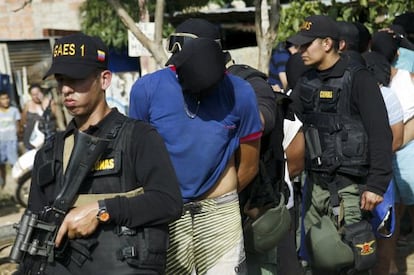Venezuela expels Colombian nationals on first day of state of emergency
Maduro government kicks out illegal immigrants as border row continues

On the first day after Venezuelan President Nicolás Maduro declared a state of emergency in five municipalities on the Colombia border, police and military focused their operations on the city of San Antonio de Táchira, where alleged Colombian paramilitary groups attacked and injured three members of the Venezuelan military last Wednesday.
About 2,400 security agents and military personnel on Saturday took over an area called La Invasión, a shantytown with dirt roads that Maduro has claimed is an informal settlement for smugglers who take subsidized Venezuelan goods into Colombia to be sold at higher prices.
Maduro has extended the border closure that followed last week’s attack on military personnel indefinitely
The raid led to the capture of eight people suspected of having links to paramilitary groups and the deportation of 185 Colombian nationals who were in Venezuela illegally. These individuals were put on four buses en route to Cúcuta, the capital of Colombia’s Norte de Santander province.
Still, Venezuelan authorities have not revealed whether they have arrested the two armed men riding a motorcycle who perpetrated Wednesday’s attack, which occurred when the soldiers were carrying out a smuggling raid. The incident initially led the government to close down the border for 72 hours but then Maduro extended the measure indefinitely on Friday night, declaring a state of emergency in parts of Táchira state and suspending constitutional guarantees.
Meanwhile, as the details of the police and military raid came to light, Táchira Governor José Gregorio Vielma Mora, an ex-captain in the Venezuelan army and member of the ruling United Socialist Party of Venezuela (PSUV) tried to present the situation in a favorable light.
During the early hours of Saturday morning, he allowed TV cameras to film a couple crossing the border by car. The woman was in labor. As the day continued he also supervised the movement of Red Cross buses as a “Humanitarian Corridor” carrying the sick in and out of the country was opened up. On the first run of the day, the organization took 40 diabetics from Ureña, Venezuela to Colombia where they normally receive their dialysis treatment.
On Monday, the Venezuelan government said it would also begin offering safe passage to students who who take classes on the other side of the border and to Colombian investors who have businesses on the Venezuelan side.
Maduro put Vielma Mora in charge of all Táchira municipalities affected by the state of emergency: Bolívar, Junín, Ureña, Capacho Libertador and Capacho Independencia. The governor met with the mayors of the five localities, all of whom belong to the opposition. In that meeting he delivered a jumbled speech, similar to one he had given to the press, explaining that a well-managed state of emergency did not suspend constitutional guarantees.
This initiative is the first attempt to manage this new situation to ensnare the busy border between the two South American countries. Despite the growing inconveniences that the closure will cause, the circumstances are not expected to change any time soon. During an event in Anzoátegui state (northern Venezuela) on Saturday, President Maduro said he did not expect to revoke the measures implemented at the border in the foreseeable future.
“I am not going to open the border until there is peace and they stop launching attacks against our economy from Colombia,” he said.
Venezuelan Foreign Minister Delcy Rodríguez and her Colombian counterpart, María Ángel Holguín, are expected to meet on Wednesday in Bogotá to explore specific actions to solve the border crisis.
On Saturday Colombian President Juan Manuel Santos said that he was willing to begin dialogue with President Maduro in order to find a solution to the situation.
Translation by Dyane Jean Francois
Tu suscripción se está usando en otro dispositivo
¿Quieres añadir otro usuario a tu suscripción?
Si continúas leyendo en este dispositivo, no se podrá leer en el otro.
FlechaTu suscripción se está usando en otro dispositivo y solo puedes acceder a EL PAÍS desde un dispositivo a la vez.
Si quieres compartir tu cuenta, cambia tu suscripción a la modalidad Premium, así podrás añadir otro usuario. Cada uno accederá con su propia cuenta de email, lo que os permitirá personalizar vuestra experiencia en EL PAÍS.
¿Tienes una suscripción de empresa? Accede aquí para contratar más cuentas.
En el caso de no saber quién está usando tu cuenta, te recomendamos cambiar tu contraseña aquí.
Si decides continuar compartiendo tu cuenta, este mensaje se mostrará en tu dispositivo y en el de la otra persona que está usando tu cuenta de forma indefinida, afectando a tu experiencia de lectura. Puedes consultar aquí los términos y condiciones de la suscripción digital.








































